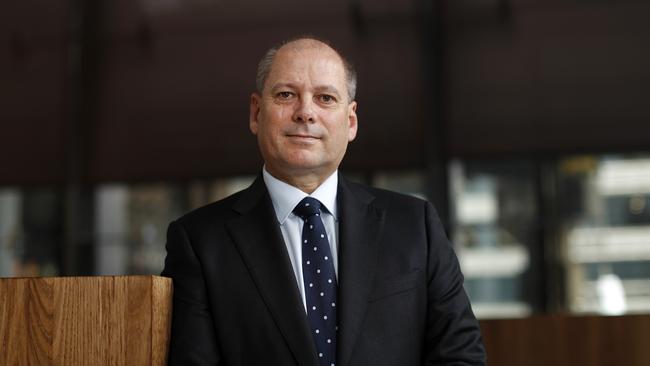Ruling on Arrium insolvent trading cases rewards honest dealings

The dramatic 2016 collapse of steelmaker Arrium, which was spun out of BHP and operated the Whyalla steelworks, is a perfect example, with the NSW Supreme Court effectively ruling on Tuesday that it would look more benignly on anyone caught in an insolvency net if their salvage efforts were genuine.
The court determined that Arrium chief financial officer Robert Bakewell and group treasurer Delia Sparkes were not personally liable for their dealings with two groups of lenders over drawdown notices which they both signed in late 2015 and early 2016.
Each notice, which resulted in the lenders extending about $100m of credit, pledged that there was no significant change in the company’s financial position, and that it was solvent at the time.
The first syndicate of lenders was led by Anchorage Capital and featured Deutsche Bank and Commonwealth Bank, while the second group was headed by Bank of Communications (BOC) of China and included Westpac.
The Anchorage plaintiffs made a string of allegations, principally that the pledges made in the notices were false, and that Arrium, Bakewell and Sparkes owed the lenders a duty of care when they signed them.
It was also alleged that, by signing the notices, the defendants engaged in misleading and deceptive conduct and were therefore liable themselves. Similar claims were made by the BOC group.
The court found comprehensively in favour of the defendants.
There was no proof that the two pledges were false when they were made, and the signatories to the notices were found not to owe a duty of care to the lenders.
It was also ruled that they acted as corporate agents without personally engaging in the alleged conduct.
Further, the Anchorage plaintiffs failed to establish reliance on the pledges, and that even if the pledges were false, they failed to prove Bakewell and Sparkes were aware of it.
“The representations were contained in a pro forma document that was required to be issued by Arrium in order to draw down on its facilities,” judge Michael Ball said.
“The terms of the representations were determined by agreements negotiated between Arrium and its lenders.
“It was not the task or responsibility of Ms Sparkes or Mr Bakewell to determine the contents of the representations made in the drawdown notices, nor did they.”
On the key issue of Arrium’s solvency, Justice Ball ruled it was the board’s responsibility to make an assessment.
This was understood by the board, which regularly passed resolutions verifying solvency from early 2016.
Similarly, it was the board’s responsibility to determine whether Arrium could continue to draw down on its facilities.
The problem faced by the lenders seems to be that they were effectively trying to access the Arrium insurance policy through the company’s employees by making them personally liable.
It remains to be seen if the case has a wider application, but it stands for the proposition that a court can recognise honest efforts to correct a solvency issue and shelter a defendant from personal liability.
–
Westpac bridges gap
The good news in Westpac’s update and Pillar 3 report on Tuesday is that growth in mortgages and business lending has finally bridged the gap to the wider banking system.
It’s been a long time coming; about two years of franchise deterioration, in fact, as Westpac chief executive Peter King struggled with mortgage processing issues offshore and board and management upheaval at home.
The bank-wide fallout continues from the $1.3bn Austrac penalty for millions of anti-money laundering breaches, with corrective action and a program of deep and far-reaching cultural change.
Despite a couple of favourable data points from Chris de Bruin’s consumer and business banking unit, you won’t hear anyone fantasising at Westpac about toppling Commonwealth Bank and NAB from their mortgage and business banking pedestals.
Instead, there’s hope that the strategy of recoupling the consumer and business banks is working, with lessons from the turnaround in mortgages successfully applied elsewhere.
There’s also hope — albeit somewhat diminishing — that the economic environment will continue to be supportive.
While Westpac’s base-case economic scenario in the Pillar 3 showed an improving outlook, a footnote confirmed that the forecasts were determined on June 7 and had since been updated to account for more recent lockdowns.
The bank’s latest estimates say the economy will grow by 2.4 per cent in 2021, down from 3.2 per cent last month and 4.8 per cent on June 7.
A very strong post-lockdown recovery is still expected in 2022.
Elsewhere in the Pillar 3, Westpac confirmed it would book a $300m specific provision on its disastrous exposure to Bill Papas’s collapsed Forum Finance.
Announcing the exposure on July 2, the bank said it had a potential exposure of about $200m after tax, with the extent of any loss dependent on the outcome of its investigation and recovery action underway.
The news on Forum Finance since then has only worsened.
Finally, Westpac’s brutal, three-year downsizing of its cost base from $10.2bn to $8bn by 2024 will kick off in the new financial year.
In the June quarter, the blip in 2021 expenses flagged by chief financial officer Michael Rowland at the half-year was reaffirmed.
Costs will therefore rise before starting their downward spiral.
Westpac’s rivals will exploit any opportunity to snatch a point or two of market share as the bank prioritises cost reduction ahead of investment in growth.
Twitter: @Gluyasr






Insolvent trading causes sleepless nights for company directors and staff, but it’s not so much the open and shut cases as those in the twilight zone.